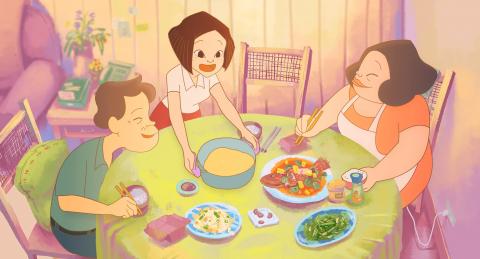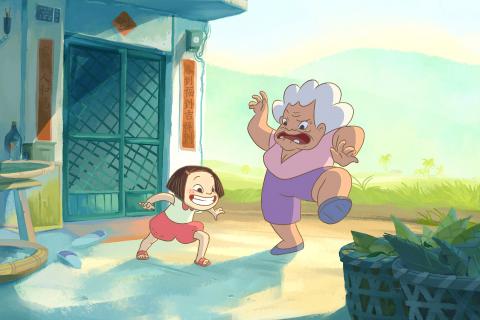Before even mentioning the well-crafted, tear-jerking story and the whimsical, colorful animations, the most impressive part of On Happiness Road (幸福路上) is how it manages to condense four decades of Taiwanese politics, economics, traditional and pop culture as well as everyday life into 109 minutes without mucking up the narrative.
Of course, the viewer probably needs to have grown up in Taiwan or have a decent understanding of its turbulent recent history to catch all the minute details, but even so, it’s a pretty solid drama following the past and present of a Chi (Gwei Lun-mei, 桂綸鎂), a Taiwanese woman in her 30s who returns home to Happiness Road from the US following the death of her grandmother. There’s so much to explore here, including parental expectations, childhood dreams, fear of having children and the pursuit of happiness. Again, some themes will speak louder to 30- and 40-somethings who went through Taiwan’s education system, but they are still universal enough for foreign audiences.
Somehow, all of this nicely fits into one movie — although the resulting emotional rollercoaster does leave the audience a bit exhausted at the end. It is an impressive debut from Sung Hsin-ying (宋欣穎), who started making this film after winning the NT$1 million top prize for the Golden Horse Film Project Promotion in 2013.

Photo courtesy of ifilm
Born on April 5, 1975, the day former president Chiang Kai-shek (蔣介石) died, Chi experienced the entire transition from martial law and autocratic rule to democracy. Her early experiences encapsulate the era perfectly, from being forced to speak Mandarin in school, to her father being addicted to buying Patriotic Lottery (愛國獎卷) tickets. Chiang was still hailed as a “great man” back then, and Chi wanted to follow his example as a child. The references are very detailed, down to using the old translation for Disneyland (迪士奈, dishinai) instead of the current dishini (迪士尼).
Chi’s friends represent a cross-section of Taiwanese society, from the mayor’s son to the daughter of a US serviceman who abandoned her mother to a child who moonlights as a “spirit medium” that predicts the Patriotic Lottery’s winning numbers. They all have different backgrounds, dreams and fates, but it’s all part of the Taiwanese experience.
Almost no stone is left unturned, as Sung even gives Chi an Aboriginal grandmother to highlight the diversity of Taiwanese culture that was suppressed back then. Her personal experiences reflect the larger picture as she is bullied due to the controversial Wu Feng (吳鳳) story in the textbooks that painted Aborigines as bloodthirsty savages that were only “reformed” through Wu’s sacrifice. This story brought shame to many Aboriginal children and would be a focal point of the later Aboriginal rights movement.

Photo courtesy of ifilm
As society changes, Chi’s world view does too, especially when her older cousin is arrested and tortured for reading the banned book by historian and independence activist Su Beng (史明), Taiwan’s 400-Year History (台灣人四百年史). The entire story follows this vein, seamlessly incorporating the social and political changes in Taiwan as Chi’s life progresses into present day. Even her time in the US coincides with major events such as the 9/11 attacks, which can make things feel a bit systematic or formulaic, but it works for the most part as the audience knows what to expect, creating a sense of order of all the underlying elements between each sequence.
The dialogue will be immediately relatable to most Taiwanese as Chi struggles to fulfill her parents’ expectations well into her 30s. But connecting the Taiwanese perspective to the world is the general theme of happiness, hence the film name. Chi has gone from a poor family who believes that having enough to eat equals happiness to achieving the American Dream, but she is still not happy. As she looks back at all the influences that shaped her life, things begin to make some sense.
Even though rooted in reality, the animation is playful as we frequently visit Chi’s dreams, imaginations and fears. The captivating illustrations are the finishing touches to the excellent story and history lesson, adding a sense of the magical to the tale that might otherwise fall a bit on the gloomy side. Her dead grandmother also frequently appears to help her out at times, topping off the fantastical elements that make this film truly a gem.

Under pressure, President William Lai (賴清德) has enacted his first cabinet reshuffle. Whether it will be enough to staunch the bleeding remains to be seen. Cabinet members in the Executive Yuan almost always end up as sacrificial lambs, especially those appointed early in a president’s term. When presidents are under pressure, the cabinet is reshuffled. This is not unique to any party or president; this is the custom. This is the case in many democracies, especially parliamentary ones. In Taiwan, constitutionally the president presides over the heads of the five branches of government, each of which is confusingly translated as “president”

Sept. 1 to Sept. 7 In 1899, Kozaburo Hirai became the first documented Japanese to wed a Taiwanese under colonial rule. The soldier was partly motivated by the government’s policy of assimilating the Taiwanese population through intermarriage. While his friends and family disapproved and even mocked him, the marriage endured. By 1930, when his story appeared in Tales of Virtuous Deeds in Taiwan, Hirai had settled in his wife’s rural Changhua hometown, farming the land and integrating into local society. Similarly, Aiko Fujii, who married into the prominent Wufeng Lin Family (霧峰林家) in 1927, quickly learned Hoklo (commonly known as Taiwanese) and

The low voter turnout for the referendum on Aug. 23 shows that many Taiwanese are apathetic about nuclear energy, but there are long-term energy stakes involved that the public needs to grasp Taiwan faces an energy trilemma: soaring AI-driven demand, pressure to cut carbon and reliance on fragile fuel imports. But the nuclear referendum on Aug. 23 showed how little this registered with voters, many of whom neither see the long game nor grasp the stakes. Volunteer referendum worker Vivian Chen (陳薇安) put it bluntly: “I’ve seen many people asking what they’re voting for when they arrive to vote. They cast their vote without even doing any research.” Imagine Taiwanese voters invited to a poker table. The bet looked simple — yes or no — yet most never showed. More than two-thirds of those

In the run-up to the referendum on re-opening Pingtung County’s Ma-anshan Nuclear Power Plant last month, the media inundated us with explainers. A favorite factoid of the international media, endlessly recycled, was that Taiwan has no energy reserves for a blockade, thus necessitating re-opening the nuclear plants. As presented by the Chinese-language CommonWealth Magazine, it runs: “According to the US Department of Commerce International Trade Administration, 97.73 percent of Taiwan’s energy is imported, and estimates are that Taiwan has only 11 days of reserves available in the event of a blockade.” This factoid is not an outright lie — that